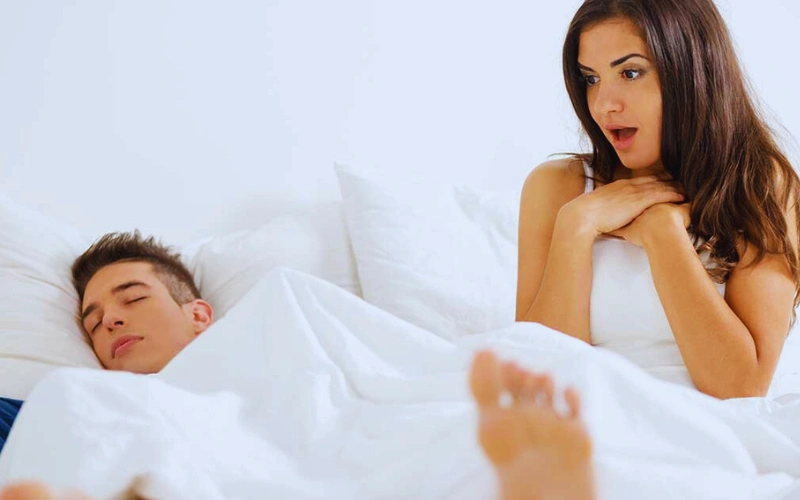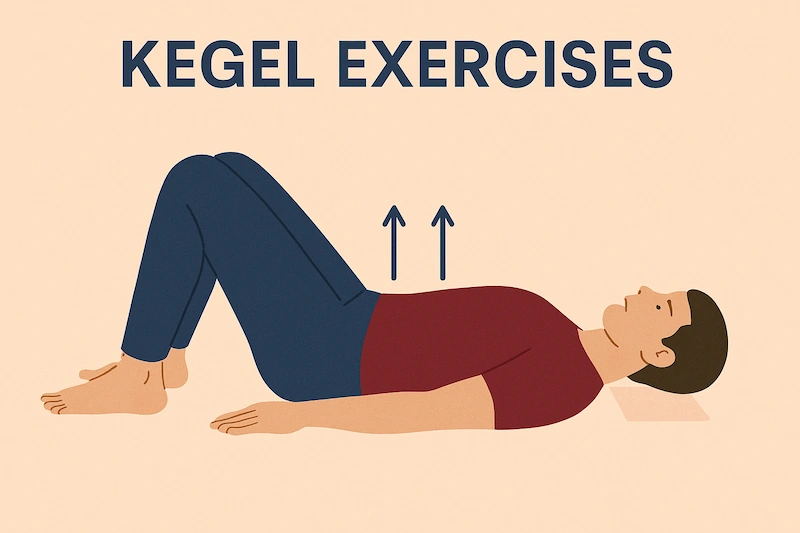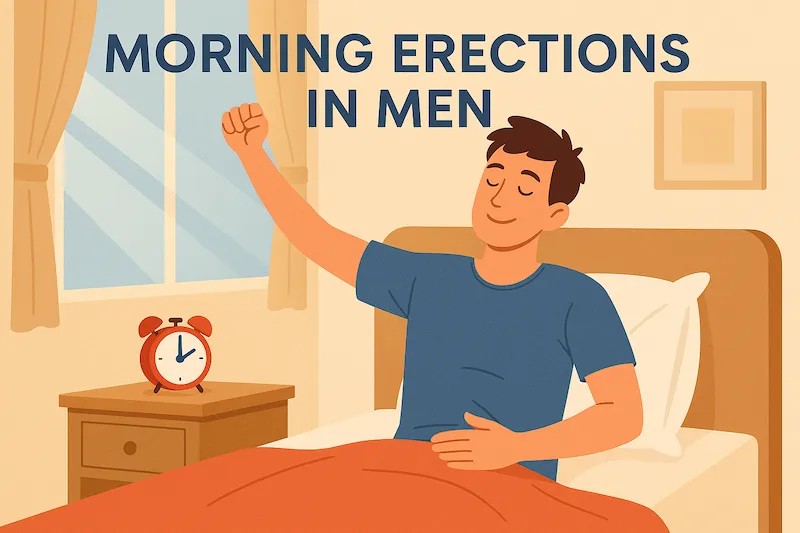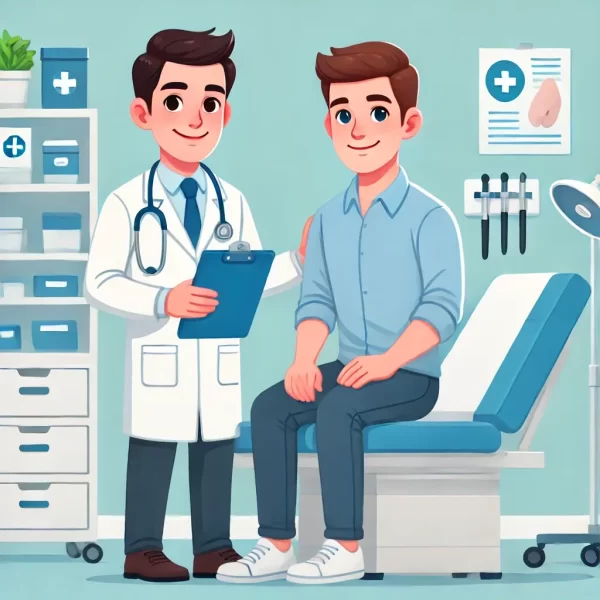Waking up with an erection – commonly referred to as “morning wood” – might seem like nothing more than an awkward inconvenience or even a harmless quirk of being a man. But what many don’t realize is that this regular early-morning occurrence, known medically as nocturnal penile tumescence (NPT), is actually a strong indicator of a man’s overall sexual, hormonal, and cardiovascular health.
Morning erections aren’t just about desire or sexual dreams — they’re the result of complex interactions between your nervous system, hormone levels, blood circulation, and sleep cycles. And when they stop happening, it might be your body’s way of sounding an alarm.
In this article, we’ll break down what morning erections really mean, why they’re more important than you think, and what it could signal if they suddenly disappear. Whether you’re experiencing changes or simply curious, understanding morning wood can help you take better control of your health — both in and out of the bedroom.
What Are Morning Erections?
Morning erections, or nocturnal penile tumescence (NPT), refer to the spontaneous erections that men often experience during sleep or upon waking. While they might seem random, they’re actually a completely normal — and healthy — physiological response.
These erections typically occur during the REM (Rapid Eye Movement) stage of sleep, when brain activity increases and the body goes through various hormonal and neurological changes. Most men experience three to five erections per night, each lasting up to 30 minutes or more.
Contrary to popular belief, morning erections aren’t always linked to sexual arousal or dreams. Instead, they’re the result of the body testing and maintaining its erectile function while you sleep.
📌 How often is normal?
For healthy men under 40, having morning erections at least a few times a week is common. A noticeable decline or complete absence may be a signal worth paying attention to – especially if it continues for more than a few weeks.

Why Do They Happen?
Morning erections are driven by a complex interplay between hormones, neurological signals, and blood flow — and they occur independently of conscious sexual arousal. Here are the main reasons why they happen:
✅ 1. Surge in Testosterone Levels
Testosterone levels are typically at their highest in the early morning, peaking between 6 a.m. and 8 a.m. This natural hormonal rise can stimulate erectile tissue and lead to spontaneous erections — especially during REM sleep.
✅ 2. REM Sleep Activation
During REM sleep, your brain becomes more active, and your body enters a state of reduced inhibition of reflexes. The body often tests various systems during this phase, including erectile function. That’s why most nocturnal erections coincide with REM cycles.
✅ 3. Reduced Norepinephrine Activity
Norepinephrine is a neurotransmitter that normally suppresses erections when you’re awake and alert. During deep sleep, levels of this chemical drop, removing the “brake” on the erectile response and allowing spontaneous arousal to occur.
✅ 4. Healthy Blood Flow and Nerve Function
Morning erections are also a reflection of proper blood circulation and nerve function. If the vascular or nervous system is compromised, morning erections may become less frequent or disappear entirely.
💡 So, while it might feel random, morning wood is actually a sign that your body — particularly your sexual and cardiovascular systems — is functioning well.
Morning Erections and Male Health
Morning erections aren’t just a biological curiosity — they’re actually a powerful barometer of male health. When they occur regularly, it usually indicates that your hormonal balance, nervous system, and circulatory function are all working properly. On the other hand, a sudden decrease or absence of morning wood could be an early warning sign of underlying issues.
✅ 1. Sexual Function & Erectile Health
Consistent morning erections suggest that the body’s erectile mechanisms are intact. Men who struggle with erections during sexual activity but still get morning wood may be dealing with psychological ED (such as performance anxiety). However, if morning wood is also absent, it could point to physical or hormonal ED.
✅ 2. Testosterone Levels
Low frequency of morning erections can be an early indicator of low testosterone, especially when combined with other symptoms like fatigue, mood swings, and decreased libido.
✅ 3. Cardiovascular Health
Erections require healthy blood flow. A decline in morning wood can signal early vascular issues, such as high blood pressure, atherosclerosis, or even an increased risk of heart disease. In fact, erectile problems often appear years before more serious cardiovascular symptoms develop.
✅ 4. Neurological Function
Because morning erections involve complex nerve signaling, a loss of this function may be tied to nerve damage or disorders like diabetes or multiple sclerosis.
💡 In short, regular morning erections aren’t just a “guy thing” — they’re a daily check-in on your overall wellness, particularly sexual, hormonal, and cardiovascular health.
What It Means If You Stop Getting Them
If you’ve noticed that your morning erections have become less frequent — or have disappeared entirely — it’s natural to feel concerned. While occasional changes can be due to harmless factors like stress or poor sleep, a persistent absence of morning wood may indicate deeper health issues that shouldn’t be ignored.
⚠️ When It’s Probably Not Serious
- Lack of quality sleep: Disruptions in REM sleep (e.g., due to insomnia or inconsistent sleep schedules) can prevent morning erections, even in healthy men.
- Temporary stress or anxiety: Psychological stress can interfere with sleep and hormone levels.
- Alcohol or late-night meals: These can affect blood pressure and hormone balance, especially when consumed before bed.
In these cases, morning erections often return once the underlying issue resolves.
When It Could Signal a Problem
If you consistently go several weeks without waking up with an erection — especially if you’re under 40 — it might be time to take a closer look at your health:
- Low testosterone: A gradual drop in morning wood is often one of the first signs.
- Cardiovascular problems: Poor circulation means less blood flow to the penis — a red flag for heart disease.
- Nerve-related issues: Conditions like diabetes, spinal injuries, or neurological disorders can interfere with the erectile reflex.
- Side effects from medications: Especially antidepressants, blood pressure drugs, or opioids.
🩺 When to See a Doctor
- If morning erections stop for more than 4–6 weeks
- Accompanied by reduced libido, fatigue, or performance issues
- Or if you’re over 40 and haven’t had a physical check-up in a while
Morning erections aren’t just about sex — they’re a real-time reflection of your health. Ignoring their absence could mean missing the early signs of a condition that’s still treatable.
How to Naturally Improve Morning Erections
If your morning erections have become less frequent — or if you just want to optimize your sexual health — the good news is that simple, consistent lifestyle changes can make a noticeable difference. Here are the most effective natural strategies:
1. Prioritize Quality Sleep
Since morning erections occur during REM sleep, getting enough quality rest is essential. Poor sleep reduces testosterone production and disrupts the brain’s natural sleep cycles.
Tips:
- Aim for 7–8 hours of uninterrupted sleep
- Create a calming bedtime routine
- Avoid screens and stimulants before bed
2. Exercise Regularly
Physical activity improves blood flow, boosts testosterone, and supports neurological function — all of which contribute to stronger erections.
Focus on:
- Strength training (3–4 times/week)
- Cardiovascular activities (e.g., brisk walking, cycling)
- Core and pelvic floor workouts like Kegel Exercises for Men

3. Eat for Hormonal Health
Your diet plays a critical role in testosterone production and vascular function. The right foods help regulate blood pressure, reduce inflammation, and promote healthy hormone levels.
Incorporate more of:
- Leafy greens (spinach, kale)
- Healthy fats (avocados, nuts, olive oil)
- Zinc-rich foods (oysters, pumpkin seeds)
📎 Explore more: 7 Foods That Naturally Boost Testosterone and Libido
4. Reduce Stress & Cortisol
Chronic stress elevates cortisol, a hormone that suppresses both testosterone and sexual desire. Managing your stress is key to restoring morning erections.
Strategies include:
- Deep breathing
- Meditation or mindfulness
- Regular leisure and unplugged time
5. Limit Alcohol and Avoid Smoking
Excessive drinking and smoking are known to damage blood vessels and lower testosterone — two major enemies of morning wood. Moderation is essential.
6. Check Your Medications
If you’re on medication (especially antidepressants or blood pressure drugs), consult your doctor about side effects. Some may be impacting your erectile function without you realizing it.
With consistent effort, many men see improvements in both morning erections and overall sexual performance in just a few weeks.
Conclusion
Morning erections may seem like a small, even humorous part of being a man — but they’re actually a powerful sign of your internal health. These spontaneous erections reflect the strength of your blood flow, hormonal balance, and nervous system function, offering daily insight into how well your body is supporting your sexual vitality.
Whether you’re getting them regularly or noticing they’ve become less frequent, paying attention to your morning wood can help you catch early signs of issues like low testosterone, erectile dysfunction, or cardiovascular problems. More importantly, this knowledge gives you the opportunity to act early — through sleep, exercise, nutrition, and stress management — before problems become more serious.
In the end, your body speaks to you in quiet, consistent ways. Morning erections are one of them. Pay attention, take action, and use this insight to build a stronger foundation for long-term sexual health.





